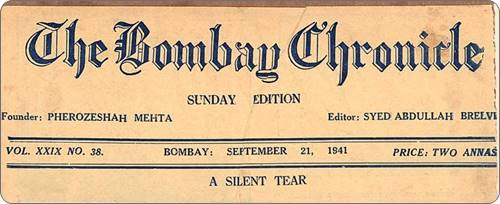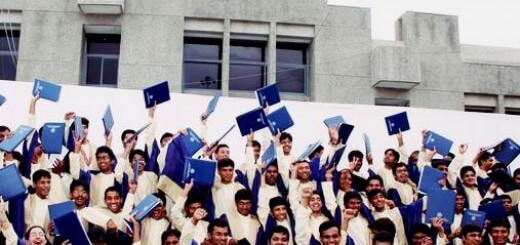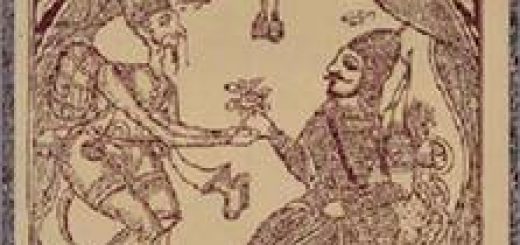Allama Iqbal’s Interview with Bombay Chronicle
Allama Iqbal’s Interview with Bombay Chronicle
On the eve of Iqbal’s departure for London to attend the second Round Table Conference, a representative of the “Bombay Chronicle” interviewed Allama Iqbal.
About his attitude to non-Muslims, Iqbal said:
“I have no prejudice agaainst any community or nation in the world. All I want is to see Islam return to its pristine simplicity. I wish to see Indians living in peace, and I am convinced such a thing is possible even while everry community retains its culture and individuality.”
Asked about his conception of Pan-Islamism Iqbal said:
“The term Pan-lslamism has been used in two senses. As far as I know, it was coined by a French journalist and in the sense in which he used that term, Pan-lsslamism existed nowhere except in his own imagination. I think the French Journalist meant to give shape to a danger which he fancied was existing in the world of Islam. The phrase was invented after the fashion of the expression “Yellow Peril” in order to justify European aggression in Islamic countries. Later on, I think the expression Pan-lslamism was taken to mean a kind of intrigue, the centre of which was in Constantinople. The Muslims of the world were understood to be planning a kind of union of all the Muslim States agaiinst the European States. The late Professor Brown of the Cambridge University has, I think, conclusively proved that Pan-lslamism in that sense never existed In Constantinople or anywhere else. There is, however, a sense in which Jamaluddin Afghani used it. I do not know if he used the same expression, but he actually advised Afghanistan, Persia, and Turkey to unite against the aggression of Europe. This was purely a defensive measure, and I personally think that 4amaluddin was perfectly right In his view.
But there is another sense in which the word should be used and it does contain the teaching of the Quran. In that sense it is not a political project but a social experiment. Islam does not recognise caste or race or colour. In fact Islam is the only outlook on life which has really solved the colour question at least in the Muslim world, a question which modern European civilisation with all its achievements in science and philosophy has not been able to solve. Pan- Islamism, thus interpreted, was taught by the Prophet and will live forever. In this sense Pan-Islamism is only Pan- Humanism. In this sense every Muslim is a Pan-Islamist and ought to be so Indeed the word Pan ought to be dropped from the phrase Pan-Islamism, for Islamism is an expression which completely covers the meaning I have mentioned above.”
Iqbal was asked whether he considered British imperialism to be godly. He replied that all States engaged in exploitation were ungodly.
The correspondent next asked the question “Do you subscribe to the view once expressed by you in a letter to Sir Francis Young that “Islam is Bolshevism plus God.”? To this, Iqbal replied as follows:
“Islam is a socialistic religion. The Quran teaches a kind of via media between absolute socialism and private property. Russia has recognised the promotion of skilled labour. Personally, I think that modern conscience will bring about fundamental changes in what you call Imperialism and Bolshevism. The days of territorial empires are over and Bolshevism, in the sense of absolute socialism, is already being modified. Russia and Britain may come to blows, because of the fundamental difference in their economic outlook; in which case it is obvious that the sympathies of all right thinking men would be on the side of justice.”
While elaborating his view Iqbal was emphatic on one point and it was that Quranic teaching was opposed to holding of land as private propertv. Iqbal added:
As far as I have been able to see from the papers the Russians are reported to have rejected the idea of God as a basis of human Society* Even If this state does exist in Russia today.
I doubt whether it will continue to exist for ever. Materialism pure and simple cannot serve as a basis for human society; and the Russians as far as I know are really a religious people.”
The correspondent asked Iqbal’s reaction to the criticism of some people who held that Iqbal the poet had been superseded by Iqbal the politician. To this Iqbal replied as follows:
“It is for my critics to judge me. But they ought to do so from my wrotings, which I am afraid few of them care to read or understand. But there is no doubt that my ideas about Nationalism have undergone a definite change. In my college days I was a zealous nationalist which I am not now. The change is due to maturer thinking. It is unfortunate that my later writings are all in Persian which is I’ttle understood in this country.”
He was asked “Dont you think that you would be more usseful to the country as a poet than as a politician? He replied that he had not ceased taking interest in literary pursuits. In fact that was still his main occupation. He referred to his latest publication ‘‘Reconstruction of Religious Thought in Islam” and said that on his return from England he intended to write more on allied subjects.
He was asked whether he was for the continuance of the princely order. He said:
“I am not tor the continuance of the Princely Order. But I am neither at heart a believer in Democracy. I tolerate Democracy because there is no other substitute.”
He was next asked as to why he was opposed to nationalism. He replied:
“I consider it against the higher ideal of Islam. Islam is not a creed, it is a social code. It has solved the colour problem. It wants to turn the minds of people into a single channel. It originally conceived the unity and the spiritual resemblance among the members of human race. Nationalism as at present understood and practised comes in the way of the realisation of that ideal and that is my argument against Nationalism.
He was asked as to what was the possibility of a federation of the Arabian States. He said:
“I believe in the federation of Arabian States, though there are some very great difficulties in the way. I have great faith in the Arabic language which has a future before it as a living language. I look upon it as 3 great bond of union among the Arabian nations next to their faith. The present condition of Hijaz is not, however, very satisfactory. It is difficult for me to forecast the future of the Arabian federation.”
He added:
“If the Muslim countries keep true to the ideals of Islam they are likely to do the greatest service to humanity. Islam, in my opinion, is the only positive system that the world possesses today provided the Muslims apply themselves to it and rethink the whole thing in the light of modern ideas. The Indian Muslim in my opinion is likely to play a very important role in the future of Islam. New Islam relies more on the younger generation which has received more education with necessary grounding in Islam.
The Ulema, if they properly apply themselves to understand the real meaning of problems, political and economic, which confront Islam today, with their knowledge of the past would be of immense, use in the future reconstruction of Islam. I have myself made my humble contribution and I hope to write more. I have tried to see the religious philosophy of Islam In the light of modern knowledge and I hope I shall find time to do the same thing with the system of Fiqh which In my opinion is much Important today than the purely the logical aspect of It. I have however begun with the philosophical aspect of it. It was, as a matter of fact, necessary as a prelude to the work of reconstruction.
I am concentrating on Fiqh which the Ulema have neglected for several centuries. The Quran must now be read as a book which throws light on the birth, growth and death of nations or rather peoples. In the history of revealed literature, the Quran is probably the first book which spoke of people as living organism. The Quran conceives people as obeying certain definite laws, of which the moral aspect the Quran has emphasised more than the other aspects.”
He was then asked whether he was going to visit any Islamic country on his way back to India after finishing the work of the Round Table Conference. He said that his desire was to visit all or at least as many of the Islamic countries as possible, but that paucity of funds would not allow him to visit many of them. He wanted to visit all Islamic countries with a view to studying conditions prevailing in those countries and he wanted to write a book on “The Modern World of Islam”.














